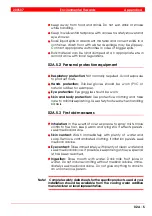
02A.6
Fly ashes and exhaust gas dust contami-
nated components
When handling the fly ashes, exhaust gas dusts and when working
inside the exhaust gas system or when handling any component
contaminated with exhaust gas dust, at least the following minimum
precautions and safety procedures must be applied:
Note! Inhaling, eye contacts, skin contacts and swallowing of fly ashes
and dusts must be avoided.
Employees must be required to study the safety instructions before
they start to overhaul the exhaust gas system or engine components
that have been in contact with exhaust gases.
Note! Spreading and spillage of the fly ashes and dusts to the environment
must be avoided.
When opening the manholes of the exhaust gas system and spe-
cially the SCR avoid spreading the dust in the surrounding area.
During replacement of components in the exhaust gas system and
during handling as well as during normal operation of the system,
dust spreading must be avoided.
Appropriate flue gas dust spillage disposal instructions must be
applied. The dusts collected from the exhaust gas system must be
considered as hazardous waste and must be treated according to
the local regulations and legislation.
02A.6.1 Personal protection equipment
·
Respiratory organs protection: Toxi particles: Use P3 filter respi-
rator or for work inside the SCR or other places in the exhaust
gas system, where the dust concentration is high, a respiration
mask with fresh filtered compressed air supply is recom-
mended.
·
Hands protection: Gloves.
·
Eye protection: Wear goggles.
·
Skin and body protection: Wear covering clothing.
Also when machining or cleaning engine components that have
been in contact with exhaust gases, proper protection according
to the above must be used.
Consideration must also be given to whether the ventilation is
suitable for collecting dust from the machining and cleaning of the
components.
Appendix A
Environmental Hazards
200507
02A - 6
Summary of Contents for PAAE051728
Page 4: ......
Page 18: ...Appendix B Welding Precautions 200640 00 6...
Page 26: ...01 Main Data Operating Data and General Design 32 200634 01 01 8 W RTSIL 32...
Page 60: ...Appendix A Environmental Hazards 200507 02A 10...
Page 68: ...Page 7 7 Document No 4V92A0645 Rev j...
Page 84: ...03 Start Stop and Operation 32 200402 04 03 12 W RTSIL 32...
Page 98: ...04 Maintenance Schedule 32 200623 01 04 14 W RTSIL 32...
Page 154: ...07 Tightening Torques and Use of Hydraulic Tools 32 200643 01 07 30 W RTSIL 32...
Page 162: ...08 Operating Troubles Emergency Operation 32 200402 01 08 8 W RTSIL 32...
Page 164: ...Specific Installation Data 2005 01 09 2...
Page 178: ...10 Engine Block with Bearings Oil Sump and Cylinder Liner 32 200150 10 14 W RTSIL 32 34SG...
Page 216: ...Appendix A Testing of cylinder tightness 32 200142 A 4 W rtsil 20 32 34...
Page 226: ...13 Camshaft Driving Gear 32 200546 02 13 10 W RTSIL 32...
Page 254: ...15 Turbocharging and Air Cooling 32 200549 10 15 20 W RTSIL 32...
Page 274: ...16 Injection System 32 200627 01 16 20 W RTSIL 32...
Page 280: ...Fuel System 32 200508 07 17 6 W RTSIL 32...
Page 314: ...19 Cooling Water System 32 200050 19 14 W RTSIL 32...
Page 394: ...23 Instrumentation and Automation 32 200115 II 23 60 W RTSIL 32...
















































